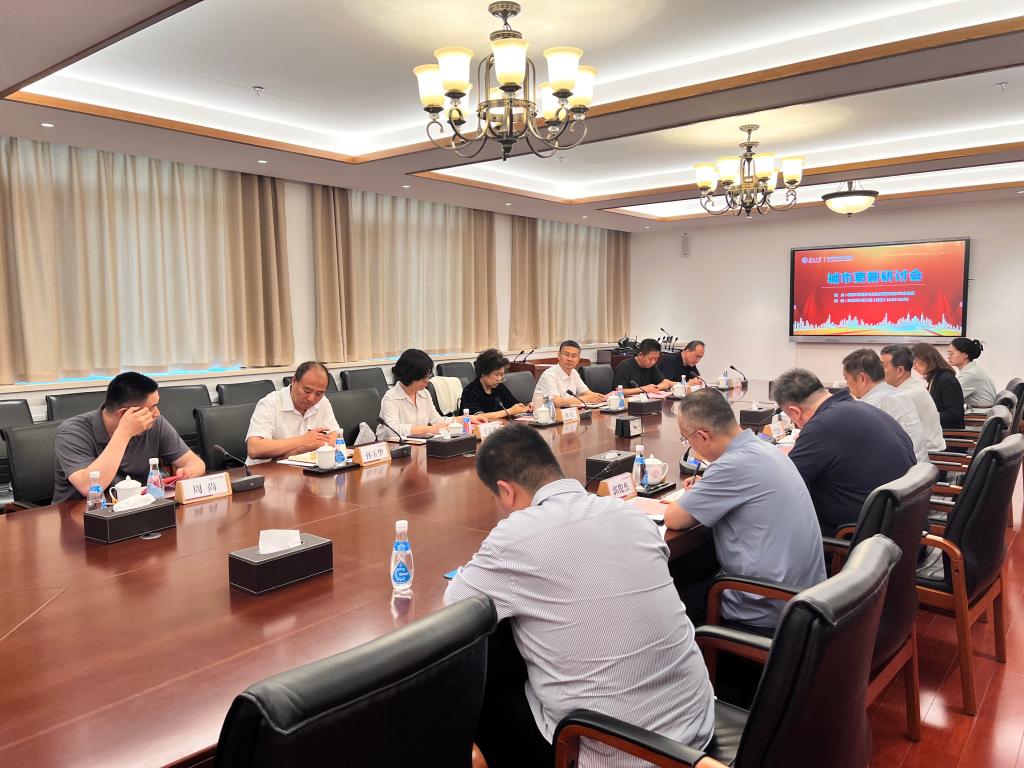On June 12, the Urban Renewal Seminar was held at the Institute of Economics and Social Development, Nankai University. The event brought together representatives from government, enterprises, and academia, including Zhang Xiaoyan (former Deputy Secretary-General of the Tianjin Municipal Government), Lu Hong (former Level 1 Inspector of the Tianjin Planning and Natural Resources Bureau), Wang Jiahui (Party Secretary and Chairman of Tianjin Energy Group), Li Qingchun (Deputy District Mayor of Hexi District), Lang Dong (Level 2 Inspector of Tianjin Municipal Bureau of Commerce), Zhang Chunyan (Party Secretary of the School of Architecture, Tianjin University), Zhang Bo (Director of Urban Design and Historical City Protection Division, Tianjin Planning and Resources Bureau), Sun Yuhua (Deputy Party Secretary of Tianjin Chentang Thermal Power Co., Ltd.), Guo Junjie (Director of Design Institute No. 8, Architectural Design and Planning Institute of Tianjin University), Liu Binglian (Dean of the Institute of Economics and Social Development at Nankai University), and Professor Zhou Mi (Director of the China Urban and Regional Economic Research Center at Nankai University). The discussion focused on the theme of urban renewal.

This seminar centered on the creation of cultural tourism IPs (intellectual properties) through urban renewal in the context of the upcoming Shanghai Cooperation Organization (SCO) Summit. In her remarks, Zhang Xiaoyan emphasized that the SCO Summit is not only an important platform for Tianjin to showcase itself internationally but also a historic opportunity to unlock the potential of the city’s cultural tourism market, reshape its urban image, and deepen the integration between the tourism industry and urban development. She stressed that urban renewal should incorporate elements of culture, emotion, and memory. Considering new circumstances, she added, urban renewal must also take on the critical roles of fostering new business formats, attracting emerging industries, driving technological innovation, and empowering city development—its strategic importance is becoming increasingly prominent.
The seminar was chaired by Dean Liu Binglian. Experts engaged in in-depth discussions on urban renewal planning, case studies, key measures, and policy support, focusing on the following key areas:
Strategic Positioning: Experts broadly agreed that the upcoming SCO Summit should be viewed as a strategic opportunity. During this window of global attention, cultural tourism should serve as a breakthrough point in urban renewal to catalyze widespread revitalization and elevate Tianjin’s overall development.
Planning Coordination: Urban renewal efforts should align with the national policy framework and focus on improving quality of life and promoting socioeconomic progress.
Conceptual Shift: Experts pointed out that urban renewal is shifting from a “demolish-renovate-retain” model to a “retain-renovate-demolish” approach, emphasizing micro-renewal and micro-transformation. Rather than large-scale demolition and reconstruction, the goal is to improve urban quality through small-scale, targeted interventions that support sustainable development.
International Case Studies: Participants shared insights from international examples such as Austria’s gasification redevelopment project and the Three Gorges Underground Museum. They recommended that Tianjin benchmark itself against advanced global models while developing a renewal path with local characteristics.
Implementation Mechanisms: Discussions covered issues such as regulatory boundaries, leadership responsibilities, and financial support mechanisms. Experts emphasized the need to leverage central government policy tools, enhance coordination among stakeholders, and use scientific metrics—such as demolition and rebuild ratios—to ensure steady progress.
At the seminar, Professor Zhou Mi from the China Urban and Regional Economic Research Center at Nankai University shared ideas on leveraging the SCO Summit to create a new urban identity for Tianjin and drive value creation across the cultural tourism industry chain.
This seminar exemplified effective integration among government, industry, academia, and research to support Tianjin’s development. It underscored the vital role of urban renewal in accelerating urban construction and provided valuable intellectual support for building a “Cultural, Consumer-Oriented, and Industrially Strong Tianjin.” In recent years, our institute has expanded its research from regional economics to include urban economics to better serve the needs of local government policymaking.